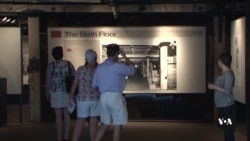The shots that rang out over Dealey Plaza in Dallas, Texas, 60 years ago — on Nov. 22, 1963 — lasted just under six seconds. And while the assassination of U.S. President John F. Kennedy profoundly changed America, those six seconds tainted the city where it occurred, marking the start of a long struggle to come to terms with Dallas' role in one of the most infamous moments in American history.
"That really cast a shadow on it," retired Dallas Deputy Sheriff Gene Boone explained to VOA while walking through Dealey Plaza in 2013. Boone, who died in 2017, was one of the first law enforcement officers to react to the shooting.
He later entered the Texas School Book Depository and found the rifle investigators say Lee Harvey Oswald used in the assassination. Boone believed Dallas lost more than just a president that day. "We were almost afraid to go outside the community and let anybody know we were from Dallas."
Dallas' identity
"The event was a source of great shame," said Jeffrey Engel, director of the Center for Presidential History at Southern Methodist University in Dallas. Engel said community leaders long struggled to balance the reality of the Kennedy assassination with the way it negatively impacted the city.
"The Kennedy assassination confirmed the identity of Dallas in American minds," he said. In 1963, he said, Dallas was home to right-wing groups such as the John Birch Society and was already known as the city where former U.S. presidential candidate and United Nations Ambassador Adlai Stevenson was attacked after giving a speech — just one month ahead of Kennedy and Vice President Lyndon Johnson's visit.
"Dallas was a place that was known at the time as a hateful, dark city on the scene of national politics," said Engel.
"So, when Kennedy was killed here in Dallas, there was this kind of collective 'Oh, Dallas, that's where things like this happen.' Dallas was a toxic environment where extremism could thrive," acknowledged historian Stephen Fagin. "It was an unfair characterization, but it lingered as a dark cloud over this community for decades."
Perspective on the tragedy
Fagin is the curator of the Sixth Floor Museum, which now occupies the sixth floor of the reddish orange brick building known as the Texas School Book Depository.
"We are a historical institution that explores the life, death, and legacy of President Kennedy and the broader history and culture of the 1960s," said Fagin.
The museum, situated at the edge of Dealey Plaza, opened in 1989 and quickly became a top tourist destination, said SMU's Engel.
"Dealey Plaza is the second-most visited tourist attraction in the state of Texas, right after the Alamo," said Engel.
The museum records attendance of more than 300,000 guests annually from 133 countries, a number that has declined since the 2020 coronavirus pandemic but is gradually increasing.
The museum's curator acknowledged that the scene of a president's death seems an unlikely destination for tourism, something Dallas city leaders struggled with as they attempted to convert the Texas School Book Depository into something else.
"There are sites in this country that are stained by violence and tragedy," said Fagin. "Dealey Plaza is one of those, much like Pearl Harbor or the footprint of the World Trade Center, and sites like this allow us to do justice to a tragic event by remembering it properly."
But, said Fagin, remembering it properly does not mean the Sixth Floor Museum draws definitive conclusions about exactly what happened in Dallas in November of 1963.
"The assassination, like so many other things, it's a very divisive topic," he said. "People typically arrive here knowing whether they believe Lee Harvey Oswald acted alone or whether there was a conspiracy."
Engel said the lingering mystique about the Kennedy assassination contributes to present-day tourism in Dallas.
"The Kennedy conspiracy theorists still hold a grip on the nation's psyche in some ways," he said. "That you can go to Dealey Plaza and tell yourself that 'I've heard the story, maybe I can piece it together a little bit myself now differently because I've seen it with my own eyes.'"
"You may be intrigued by the nuances of the assassination, the lingering questions surrounding bullet trajectories and medical evidence," said Fagin. "But at the end of the day, something died here and Dealey Plaza sort of stands for that unfulfilled hope and promise that John F. Kennedy represented."
Exorcising demons
The Sixth Floor Museum is not just a series of exhibits, it is also an archive. Some of the film footage of the assassination is preserved and licensed by the museum, as are recordings of oral histories of eyewitnesses and key figures in the events. Collectively, they fill the museum with more than just physical artifacts that help put a watershed moment of the 20th century into perspective historically, and locally.
"Certainly, I think Dallas has tried to come to terms with this dark moment in its past, and internalize the assassination in many ways," Fagin told VOA during an interview on the Sixth Floor, "and this museum has played a key role in helping this community exorcise the last remaining demons from 1963."
Dallas Sheriff Gene Boone lived long enough to see the city where he was born and raised emerge from the dark cloud of the assassination he personally witnessed. He credited the Sixth Floor Museum for aiding that transformation. "If you come here and see it and hear the story, you can really, fully come to realize that it could happen anywhere, at any time," Boone told VOA in 2013.
Now, Boone's story and memories of those fateful days in Dallas 60 years ago lives on among the oral histories recorded for posterity in the permanent collections of the Sixth Floor Museum.






